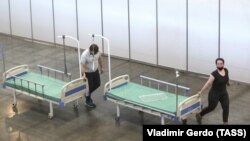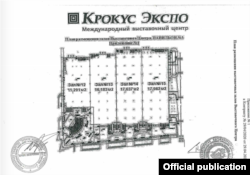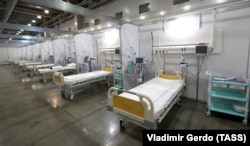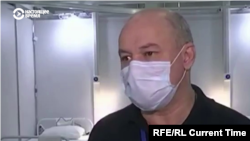This April, Azerbaijani-Russian businessman Araz Agalarov faced a problem: Russia’s coronavirus lockdown had knocked the income out of his sprawling real-estate-development empire, and the 65-year-old tycoon, a former business partner of U.S. President Donald Trump, believed he was facing potential bankruptcy.
“The ship, with 15,000 people, is simply slowly sinking to the bottom under the eyes of the ship’s captain, who can’t even pump out water because they just don’t give any chance to do that,” Agalarov told the RBK news site.
But this “captain,” a veteran of large-scale construction projects for Russia’s public and private sectors, did not have long to worry. Within just over a week after Agalarov’s April 21 interview, his holding company, the Crocus Group, would begin to receive, tender-free, government contracts worth over $27.4 million (1.9 billion rubles) for converting two halls in its Crocus Expo center in the Moscow suburb of Krasnogorsk into temporary hospitals for COVID-19 patients.
Concluded on April 29, the first set of contracts, for work in the Expo center’s 17,942-square-meter hall number 15, was worth nearly 1.04 billion rubles (over $15 million), an investigation by Current Time and the Russian investigative outlet Scanner Project found.
In a May 12 interview with the Komsomolskaya Pravda daily, Agalarov stated that his company had agreed with the regional Moscow Oblast government on a discounted monthly rent of 55 million rubles, over $800,333. The government, he said, could not afford the usual monthly fee of 178 million rubles (roughly $2.6 million).
Shortly after this first agreement was reached, contracts totaling nearly 876.3 million rubles (about $12.7 million) for conversion of a second, neighboring hall (number 14) in the Crocus Expo Center also appeared on Russia’s state procurement portal.
Outside of this total, Current Time has identified two separate contracts with the Crocus Group, totaling roughly 12 million rubles ($174,634), to provide accommodation for doctors and patients at a Crocus-owned hotel near the exhibition center and for food deliveries to hospital patients.
None of these contracts came with a public tender. Under an emergency order by Moscow Oblast Governor Andrei Voroblyov, the local government can sign contracts to convert facilities into coronavirus hospitals without either tenders or public hearings.
“If they had launched this procedure,” Agalarov commented on May 12 in reference to tenders, “I think it would still be going on.” Instead, the emphasis was on speed. He told Komsomolskaya Pravda that it took his Crocus Group just eight days to finish the first hospital in the Crocus Expo center.
The Krasnogorsk City Clinical Hospital No. 1, a government-run facility, is the contractee in the contracts with the Crocus Group and is administering the company’s two temporary COVID-19 hospitals.
Together, the hospitals can accommodate 2,600 patients.
But complaints by medical staff and patients about conditions in the first hospital, as reported by Current Time and the anti-corruption Scanner Project, have now raised questions about the value of these deals for taxpayers.
Making An Exhibition Center Into A Hospital
Agalarov’s Crocus Group, founded in 1989, has a long reputation for being the Russian government’s go-to developer for critical projects. It is handling construction for the first stage of the Central Ring Highway around Moscow; it was also the contractor for two stadiums in Russia for the 2018 FIFA World Cup championships and built the venue for the 2012 Asia-Pacific Economic Cooperation summit.
In Krasnogorsk, a Moscow suburb where Crocus Group is registered, the company’s private and public projects intermesh. Its two makeshift COVID-19 hospitals in the suburb’s 549,000 square-meter Crocus Expo center, touted as one of the world's largest exhibition facilities, are part of Crocus City, an amalgamation of high-end shopping malls, accommodation, an oceanarium, and a concert hall that, in 2013, hosted then U.S. businessman Donald Trump’s Miss Universe contest. To facilitate travel to and from Moscow, the Crocus Group built a local metro station.
A hospital is among the few large-scale building projects missing from this company’s portfolio.
That, however, apparently posed no obstacle for its April and May deals with the government-run Krasnogorsk City Clinical Hospital No. 1.
Initially described as an observation facility for those with mild COVID-19 symptoms, hall No. 15, equipped with 1,500 beds, began to accept patients on the night of May 14.
Ironically, though, as of Маy 22, none of these patients had been diagnosed with COVID-19; only with bilateral polysegmental pneumonia, medical staff told Current Time. This double lung infection is often associated with the novel coronavirus.
One of the Crocus Expo hospital patients interviewed by Current Time described the hospital’s general conditions as good, with spacious rooms and three meals a day.
The Crocus Group did not allow Current Time inside the hospital to film the interior, but a photo-report by RBK and the Krasnogorsk Poima photo-news account on Instagram revealed some details.
Mobile partitions in the exhibition center form makeshift rooms for four patients each. A few of these spaces contain dozens of power outlets, presumably for medical equipment, and a significant distance between the beds.
Bathrooms consist of a shower, sink, and toilet, but for how many patients is unclear.
According to Agalarov, the facility’s temperature and ventilation are closely monitored, and televisions and an Internet connection are available for patients.
But as in other Russian hospitals and throughout the region, a shortage of medicine, qualified medical personnel, and personal protective equipment remain serious problems, medical staff and patients commented in May.
A Showcase Hospital With Shortages
One Moscow resident, Anna Sviridyuk, told Current Time that her parents had been hospitalized in Crocus Expo for two days before physicians treated her mother. There was “no medication” or “any kind of treatment” for her three roommates or her during that time, Sviridyuk alleged.
By the time physicians attended to her mother, she continued, her condition had severely worsened, leaving the older woman “incoherent” on a phone call.
At the end of the second day, Sviriyuk’s mother apparently was given an injection of an antihistamine (diphenhydramine) and an anti-inflammatory medication (analgin) to address her COVID-19 symptoms. “That’s the only injection that she received,” said Sviriyuk.
Some patients report other shortages: respirators and blood thinners, in particular.
Documents from Russia’s state procurement portal show that the Krasnogorsk City Clinical Hospital purchased anticoagulents for delivery only in June.
Devices for assisting with oxygen intake – both respirators and the Russian-made Bobrov apparatus for subcutaneous oxygen therapy -- are also reportedly lacking.
That can prompt a difficult decision: Taking a respirator or Bobrov apparatus away from one patient to give to another is “awful,” one doctor said.
Though patients are supposed to be transferred into the Krasnogorsk City Clinical Hospital’s intensive care unit if their oxygen saturation levels fall to 90 percent or below, this physician alleged that the hospital’s intensive care unit prefers that the patients stay in the Expo Center.
The Expo Center, however, lacks sufficient proper equipment, the physician said.
“If you’re not ready for this [situation], don’t take patients,” the physician said. “Do we really have such a situation that we’re compelled not to take patients to the hospital, but must take them to a temporary, in-patient care point, similar to a military training area, where there’s nothing?”
Aside from respiratory aides, the hospital also began to run out of personal protective equipment during its first week of operation, the physician continued.
To sanitize face masks, “very uneducated” orderlies plunged the masks and their detachable filters into bleach, the doctor alleged. “They lost their filtering function, and it was impossible to breathe.”
The Krasnogorsk City Clinical Hospital declined to discuss with Current Time the situation at the Expo Center facility and advised that the station instead contact the regional Health Ministry.
The Moscow Region’s Health Ministry did not respond to Current Time’s questions about the hospital.
It has since denied that any shortages of medicine or personal protective equipment exist.
After Current Time’s May 22 report about these shortages, Crocus Expo medical staff and patients stated that medicine and “additional equipment” began to be brought into the temporary hospital two days later.
High Risk, No Pay?
For all the difficulties, interviewed medical staff generally praised the Krasnogorsk City Clinical Hospital No. 1 doctors and nurses who provide most of the care in the Crocus Expo center.
But, based on Current Time’s interviews, not all of the temporary hospital’s medical personnel appear to have contracts for their work or to have been paid. Chat-room questions to management about when the agreements will be ready go unanswered, alleged one doctor.
Only on May 22, eight days after the hospital’s opening, did nurses start to sign their first work agreements, Current Time’s investigation found. (Current Time has a copy of one such agreement.)
Regional prosecutors on May 24 announced that they are reviewing these allegations that the temporary hospital has failed to pay some medical staff or sign contracts for their work. They have not disclosed the current status of that enquiry.
The promised rate of pay, though, reportedly is changing. At first, interviewed doctors said, they were promised 250,000 rubles ($3,608) for 36 hours of work per week – an amount anywhere from three to five times the average monthly pay in state-run hospitals.
Now, the interviewed doctors say, that pay requires 72 hours per week. Nurses reportedly face a potential 43-percent pay cut to some 90,000 rubles or $1,300 per month; orderlies, by 28 percent, to 65,000 rubles, about $938, staff said.
They allege that, if they complain, the temporary hospital’s management has threatened to reduce their salaries still further.
Both the hospital’s director and its manager of admissions hail from the Siberian city of Krasnoyarsk, the hometown of Moscow Region Governor Andrei Vorobyov and his father, Senator Yury Vorobyov,
Director Arkady Kogan formerly oversaw Krasnoyarsk’s emergency services hospital, while admissions manager Aleksandr Kangun, a onetime emergency-room doctor, ran a Siberian car-dealership company charged with fraud in 2018. Kangun does not appear to have practiced medicine since the mid-1990s.
Students from the dentistry department of the state-run RUDN (Peoples’ Friendship University of Russia) also work in the temporary hospital, as do students from the Krasnogorsk medical college and other specialists retrained for medical care in an epidemic.
One interviewed doctor, however, noted deficiencies: “As a doctor, I see personnel who, in theory, are not able to do anything. Out of 10 nurses, one can find a vein.”
The orderlies allegedly include individuals with no medical knowledge or work experience. “They took students from the law departments, lawyers, engineers, plumbers, sales clerks,” the physician claimed.
In his interview with Komsomolskaya Pravda, Agalarov stated that he had not “inspected” the selection of medical personnel.
Neither the hospital management nor Moscow Region officials responded to the allegations made by medical staff and patients. The Crocus Group also declined to comment about the hospital. “That’s the prerogative of the Moscow regional government,” a spokesperson said.
Agalarov himself, however, appears to see small room for criticism.
The Crocus Group, he told Komsomolskaya Pravda, is taking a sizable loss on renting and converting an exhibition space for use as a hospital.
But a profit, Agalarov stressed, is not his company’s goal.
“The main thing now is to help people: the sick and those who treat them, who care for them,” he said.











